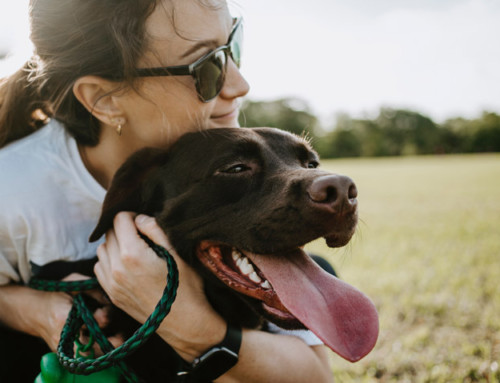Dog foster carers are the guardian angels in the community who take care of rescue dogs and provide a ‘halfway house’ until their forever home can be found. Like a furry guest in your home, this means you provide a bed to sleep in, food and water, company, walks, and general care.
It’s certainly not for everyone. Sometimes the dogs are traumatised and confused, and so may not be easy to handle. But it can be very rewarding knowing that you’ve provided them with a second home and a place to recover from their past.
Being a foster carer is a serious commitment and demands your time and effort; of course you should also have a genuine desire to help and care for dogs. If you feel this is for you, you will definitely get the returns in terms of feeling good in the knowledge that you’ll be making a difference to another life, and by taking care of one pet you’ll be making room for another.
Have a read of this story that tells the experience of a couple who fostered a beautiful dog for just a month or so.
How to become a foster carer
The best way to find out more about fostering is through one of your local rescue groups. Most rescue organisations, who take dogs from the pounds that would have otherwise been euthanised, use the service of foster carers and are always on the lookout for new people.
There are also hundreds of dog breed clubs in Australia, and many now offer rescue/rehoming services and are always happy to find new foster parents. So if you’re keen on a particular breed, this may be the route to go down for you.
What to expect when you become a foster carer
- The rescue organisation will most likely assess you as a foster carer and try to the best of their abilities to ensure the match is good,
- Each rescue organisation is different, so there are no rules here. But some may only have a couple of people working on the rehoming of dogs while others may have a whole team! Some rescues also maintain a number of dogs themselves, while others simply organise the fostering and adoption,
- If you sign up as a foster parent, it’s not just a one off event. When one pet is rehomed you may be asked to take care of another. A bit like maintaining a boarding home for dogs!
- You can generally request a specific age, size, and other characteristics of the dog you’d like to foster; for example big or small, active, friendly with cats, and so on,
- Most rescue organisations take care of vet fees for things like desexing, microchipping, and vaccinations. But generally, you’ll be expected to take care of their food and daily needs.
What does a foster carer do?
- Your main responsibility is to provide a loving home for your foster dog. This means a bed, roof over his head, walks, food, tummy rubs, and so on. Whatever your circumstances, you need to ensure that you have the time to commit to at least two walks a day with your furry friend.
- Some rescue groups do provide food and healthcare for the foster dogs, but this is mostly your responsibility. Of course, if this is difficult you can just let the rescue organisation know and they’ll definitely help out if they can.
- An important part that you’ll play is understanding the dog’s behaviour and temperament, and feeding this information back to the rescue organisation as this helps them find a new forever home that will really last forever!
- Depending on the dog, you may need to teach some basic good manners and ensure that they listen to your commands. A well behaved dog means a happy dog, as the new owner will find them a pleasure to be with.
- Socialisation is also very important. Your foster dog should have as much exposure as possible to other dogs and people. Obviously you would do this gradually so you can work out your dog’s reactions. This is where you look out for behavioural traits that need to be taken into account when finding their forever home.
- Of course every dog is different, and the rescue organisation will give you guidelines and help with introducing your particular dog to this new environment, people, and other animals in a safe and considered way. They also welcome calls if you have any questions.
- There will be a wide range of factors affecting a dog’s behaviour including its age, background, breed, and so on, but in some cases little is known about where the dog has come from, so be prepared for the unexpected!
- Generally speaking, there’s no fixed time that you may have a dog. Some are easier to find new homes for than others. So it’s important to consider this when you make the commitment. Of course if your circumstances change and you can’t keep on taking care of your dog, you can give the rescue organisation notice (don’t just dump the dog back at the rescue organisation) – they’ll need time to find another foster carer.
- Under no circumstances should the dog be taken to the pound or given to any other organisation.
- Remember that you’re not their forever home. Some people can fall in love with their adopted pets and find it hard to give them up at the end of the foster period. Try and prepare yourself for this difficult day. Of course if your circumstances allow, you can adopt them!
Before you take the leap, have a read of this real life example of a foster story, which also gives tips on how to welcome a foster dog into your home.
There’s nothing like seeing a beautiful pet getting a second chance at life. There are lots of animals in need out there, and they often end up in this situation through no fault of their own. Fostering is a great way to help others in need. Petsecure provides support to a number of rescue organisations who are always looking for foster carers. Find out more about them here.







hi my name is chad stuart and i was asking around my aear to find about about aniamls if the ones that come in to you poeple are abused in any way as like to write speeches about animal abuse so could you get back to me asap.
many thanks
chad
Hello Chad we are not a rescue organisation so I am sorry we cannot help you.